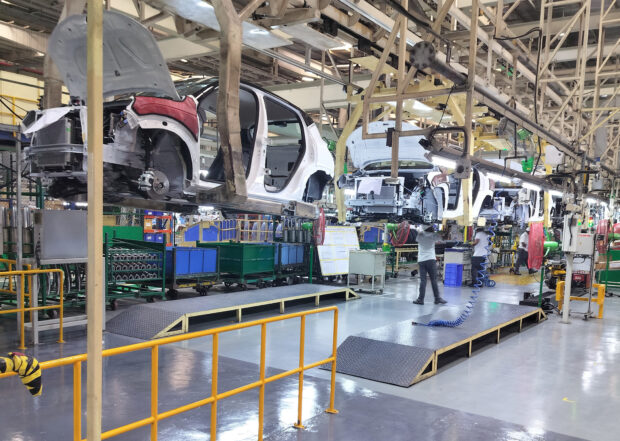
Employees assemble different parts onto car panels at an assembly line inside the manufacturing plant of Renault Nissan Automotive India in Oragadam in the southern state of Tamil Nadu, India, March 27, 2024. REUTERS/ Praveen Paramasivam/File photo
BENGALURU — India’s manufacturing industry enjoyed solid growth in March, expanding at the fastest pace in 16 years thanks to accelerating demand, according to a survey that also showed hiring increased at the strongest rate in six months.
Ahead of a general election this month, the data is likely to boost support for Prime Minister Narendra Modi’s government, which has focused on manufacturing to improve the economy, already the fastest-growing among its major peers.
The HSBC final India Manufacturing Purchasing Managers’ Index, compiled by S&P Global, rose to 59.1 last month from February’s 56.9, the highest since February 2008, but slightly lower than a preliminary estimate of 59.2.
That puts the reading above the 50-mark, which separates growth from contraction, for a 33rd consecutive month – the longest streak since July 2013.
“The HSBC final India Manufacturing PMI indicates that production growth continued to be strong, supported by both domestic and external demand,” said Ines Lam, economist at HSBC.
Exports grew at fastest pace in two years
Both output and new orders sub-indexes rose to their highest levels since October 2020. Exports expanded at the fastest pace in nearly two years.
That boosted hiring in March and employment generation was at its strongest since September after remaining largely stagnant in the previous two months.
READ: India’s Feb business activity accelerated to seven-month high on solid demand
“Buoyed by robust demand and improving profit margins, manufacturers have an optimistic outlook about future business conditions,” added Lam.
While the outlook for the upcoming year was optimistic, the sub-index eased for a second month to 63.3 as inflation concerns weighed on confidence.
Input costs rose at the fastest pace in five months but not all were passed on to clients, with the prices charged sub-index at its lowest in over a year as efforts to retain customers prevented some firms from hiking fees.
READ: South Asia’s jobs creation lags population growth —World Bank
Concerns about sticky inflation have led the Reserve Bank of India to push back against interest rate cuts, with no one in a Reuters poll expecting it to pivot this month and the first cut to not come until the September quarter.